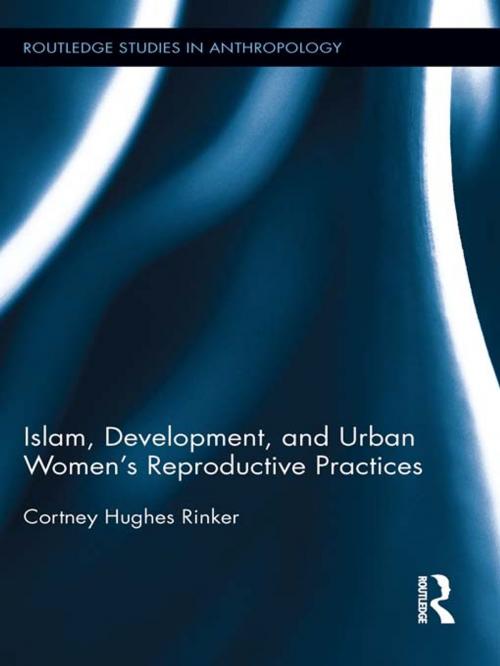Islam, Development, and Urban Women's Reproductive Practices
Nonfiction, Religion & Spirituality, Middle East Religions, Islam, Social & Cultural Studies, Social Science, Gender Studies, Women&, Anthropology| Author: | Cortney Hughes Rinker | ISBN: | 9781136683596 |
| Publisher: | Taylor and Francis | Publication: | September 2, 2013 |
| Imprint: | Routledge | Language: | English |
| Author: | Cortney Hughes Rinker |
| ISBN: | 9781136683596 |
| Publisher: | Taylor and Francis |
| Publication: | September 2, 2013 |
| Imprint: | Routledge |
| Language: | English |
Drawing on fieldwork conducted in Rabat, Morocco, this ethnography analyzes the relationship between neoliberal development policies, women’s reproductive practices, and popular understandings of Islam. In the 1990s, Morocco shifted its attention from economic to human development, as economic reforms in the preceding decades ultimately did not address social issues such as access to healthcare and education and poverty. Development programs like the National Initiative for Human Development seek to create modern citizens who are responsible, self-sustaining, and will make choices that better their well being. Hughes Rinker considers the implications that the reorientation from primarily economic to social development has on reproductive healthcare. Drawing on observations in health clinics; interviews with patients, medical staff, and at government and development agencies; and a document analysis, she demonstrates how women appropriate the medical practices and spaces of intervention aimed at creating modern citizens to form new religious identities, novel ideas of motherhood, and interpretations of neoliberal citizenship based on Islamic beliefs. Women’s interpretations of Islam are not incompatible with the state’s agenda for modernization, but rather serve as rationale for women to accept modern reproductive practices, such as contraception and pregnancy tests. However, even though female patients appropriate medical practices, they reinscribe development tropes that suggest they participate in modernization through their reproductive bodies and mothering instead of their productive labor. Hughes Rinker complicates neoliberalism as she shows it is unproductive to have a set conceptualization of neoliberal citizens, and more productive to examine the practices and discourses that create such citizens.
Drawing on fieldwork conducted in Rabat, Morocco, this ethnography analyzes the relationship between neoliberal development policies, women’s reproductive practices, and popular understandings of Islam. In the 1990s, Morocco shifted its attention from economic to human development, as economic reforms in the preceding decades ultimately did not address social issues such as access to healthcare and education and poverty. Development programs like the National Initiative for Human Development seek to create modern citizens who are responsible, self-sustaining, and will make choices that better their well being. Hughes Rinker considers the implications that the reorientation from primarily economic to social development has on reproductive healthcare. Drawing on observations in health clinics; interviews with patients, medical staff, and at government and development agencies; and a document analysis, she demonstrates how women appropriate the medical practices and spaces of intervention aimed at creating modern citizens to form new religious identities, novel ideas of motherhood, and interpretations of neoliberal citizenship based on Islamic beliefs. Women’s interpretations of Islam are not incompatible with the state’s agenda for modernization, but rather serve as rationale for women to accept modern reproductive practices, such as contraception and pregnancy tests. However, even though female patients appropriate medical practices, they reinscribe development tropes that suggest they participate in modernization through their reproductive bodies and mothering instead of their productive labor. Hughes Rinker complicates neoliberalism as she shows it is unproductive to have a set conceptualization of neoliberal citizens, and more productive to examine the practices and discourses that create such citizens.















